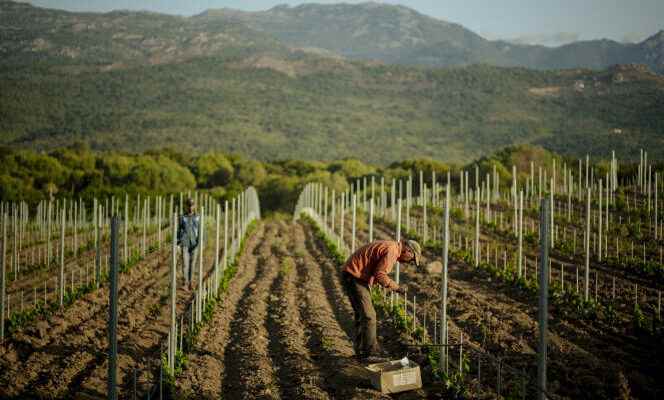They are more and more numerous. In 2022, the General Directorate for Foreigners in France (DGEF) issued 22,000 seasonal work permits to foreigners outside the European Union. And according to the French Office for Immigration and Integration (OFII), more than 10,000 workers have already arrived in France, twice as many as in 2021. This growth is explained by “the lifting of health constraints and increased tensions in the labor market”says the DGEF.
By way of comparison, in 2012, just over 1,000 first residence permits ” seasonal worker ” had been issued and there were nearly 5,600 in 2019, before the pandemic.
Foreign seasonal workers are 75% of them Moroccans, almost exclusively men employed at minimum wage by farmers, particularly in the regions of Provence-Alpes-Côte d’Azur, Nouvelle-Aquitaine, Auvergne-Rhône-Alpes and Occitania.
Bilateral labor agreements specify the rules for recruiting foreign seasonal workers. Those concluded by France with Morocco and Tunisia date back to 1963. They provide, for example, for a medical visit to the offices of the French Office for Immigration and Integration (OFII) in Morocco or Tunisia, in charge by France of part of the transport of seasonal workers or the fact that they must report themselves on their return to their country of origin.
“There is no reflection”
The Franco-Moroccan agreement also provides for France to communicate its labor needs at least once a year and for Morocco to state the availability of workers, while the 2008 agreement between Paris and Tunis concerted management of migrations establishes an objective to be reached of 2,500 Tunisian seasonal workers.
From time to time, the news reminds us of the importance of these foreign workers. In the context of the Covid-19 pandemic and border closures, planes have been chartered by employers to transport seasonal agricultural workers. An airlift between Morocco and Haute-Corse was notably organized in October 2020 to save the clementine harvest.
Very recently, the hotel and catering trade union Union des métiers et des industries de l’hôtellerie declared that it had signed an agreement on June 30 with the Tunisian Pôle emploi to facilitate the arrival of several thousand seasonal workers in France. The idea is that the two parties identify and select candidates for emigration to Tunisia and that their CVs are accessible free of charge to employers on an online platform. “This initiative is private and its contours are blurred both from the point of view of volumes and employers, warns, however, the director of the OFII, Didier Leschi. To bring in a seasonal worker, you need a work contract, knowing where people are staying, a work permit, a visa…”
“We are rather preparing for the winter seasonspecifies for its part the UMIH. This summer, many restaurants have adapted by closing certain days of the week. » The sector assesses its annual hiring needs at 200,000.
“Calling on foreign seasonal workers is an easy thing, esteems Mr. Leschi for his part. There is no reflection either on the side of the Ministry of Agriculture or the Ministry of Labor to, for example, take care of the refugees already present on the territory, build vocational training courses and meet the needs of the population. ‘agriculture. »
Questioned, an executive from the Ministry of the Interior gives his analysis more broadly, on condition of anonymity: “There is room for a public debate on the little hands that make the economy live, unskilled immigration. But the sectors also need to ask themselves the question of their attractiveness and levels of remuneration. »
